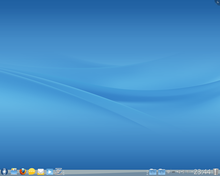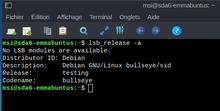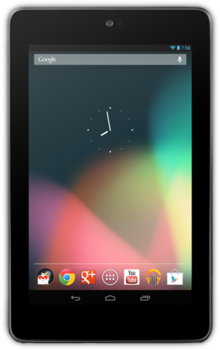The Linux Portal
Linux (/ˈlɪnʊks/, LIN-uuks) is a family of open-source Unix-like operating systems based on the Linux kernel, an operating system kernel first released on September 17, 1991, by Linus Torvalds. Linux is typically packaged as a Linux distribution (distro), which includes the kernel and supporting system software and libraries, many of which are provided by the GNU Project.
Linux was originally developed for personal computers based on the Intel x86 architecture, but has since been ported to more platforms than any other operating system. Because of the dominance of Linux-based Android on smartphones, Linux, including Android, has the largest installed base of all general-purpose operating systems as of May 2022[update]. Linux is, as of March 2024[update], used by around 4 percent of desktop computers. The Chromebook, which runs the Linux kernel-based ChromeOS, dominates the US K–12 education market and represents nearly 20 percent of sub-$300 notebook sales in the US. Linux is the leading operating system on servers (over 96.4% of the top one million web servers' operating systems are Linux), leads other big iron systems such as mainframe computers, and is used on all of the world's 500 fastest supercomputers (as of November 2017[update], having gradually displaced all competitors).
Linux also runs on embedded systems, i.e., devices whose operating system is typically built into the firmware and is highly tailored to the system. This includes routers, automation controls, smart home devices, video game consoles, televisions (Samsung and LG smart TVs), automobiles (Tesla, Audi, Mercedes-Benz, Hyundai, and Toyota), and spacecraft (Falcon 9 rocket, Dragon crew capsule, and the Perseverance rover). (Full article...)
Selected articles -
Release news
- 2024-10-29 Fedora Linux 41 released.
- 2024-10-10 Ubuntu 24.10 "Oracular Oriole" released.
- 2024-09-18 GNOME 47 released. (announcement)
- 2024-09-15 Linux kernel 6.11 released.
- 2024-07-14 Linux kernel 6.10 released.
- 2024-05-12 Linux kernel 6.9 released.
- 2024-04-25 Ubuntu 24.04 LTS "Noble Numbat" released.
- 2024-04-23 Fedora Linux 40 released.
- 2024-03-20 GNOME 46 released. (announcement)
- 2024-03-10 Linux kernel 6.8 released.
- 2024-02-28 KDE Plasma 6 released.
- 2024-01-07 Linux kernel 6.7 released.
- 2023-11-20 Rocky Linux 9.3 released
- 2023-11-07 Fedora Linux 39 released.
- 2023-10-30 Linux kernel 6.6 released.
- 2023-10-12 Ubuntu 23.10 "Mantic Minotaur" released.
- 2023-09-20 GNOME 45 released.
- 2023-08-27 Linux kernel 6.5 released.
- 2023-06-26 Linux kernel 6.4 released.
- 2023-06-10 Debian 12 "bookworm" released.
- 2023-05-16 Rocky Linux 9.2 released.
- 2023-05-10 AlmaLinux 9.2 "Turquoise Kodkod" released.
- 2023-04-23 Linux kernel 6.3 released.
- 2023-04-20 Ubuntu 23.04 "Lunar Lobster" released.
- 2023-03-22 GNOME 44 released.
- 2023-02-19 Linux kernel 6.2 released.
- 2022-12-11 Linux kernel 6.1 released.
- 2022-11-16 Red Hat Enterprise Linux 9.1 and AlmaLinux 9.1 released.
- 2022-11-15 Fedora Linux 37 released.
- 2022-10-20 Ubuntu 22.10 "Kinetic Kudu" released.
- 2022-10-02 Linux kernel 6.0 released.
- 2022-09-21 GNOME 43 released-
- 2022-07-31 Linux kernel 5.19 released.
- 2022-05-26 AlmaLinux 9 released.
- 2022-05-22 Linux kernel 5.18 released.
- 2022-05-18 Red Hat Enterprise Linux 9 released.
- 2022-05-10 Fedora Linux 36 released.
- 2022-04-21 Ubuntu 22.04 LTS "Jammy Jellyfish" released.
- 2022-03-23 GNOME 42 released.
- 2022-03-20 Linux kernel 5.17 released.
- 2022-02-02 Slackware 15.0 released.
- 2022-01-09 Linux kernel 5.16 released.
- 2021-11-02 Fedora Linux 35 released.
Selected image
GNOME desktop environment from the GNOME Project.
Related portals
Selected biographies -
General images -
Did you know?

- ... that it is now possible to run Linux on an Apple-silicon Mac?
- ... that Leafpad is a text editor for Linux that is comparable to Notepad for Windows?
- ... that researchers submitting to the IEEE Symposium on Security and Privacy intentionally introduced security bugs into Linux?
WikiProjects
Topics
Subcategories
Associated Wikimedia
The following Wikimedia Foundation sister projects provide more on this subject:
-
Commons
Free media repository -
Wikibooks
Free textbooks and manuals -
Wikidata
Free knowledge base -
Wikinews
Free-content news -
Wikiquote
Collection of quotations -
Wikisource
Free-content library -
Wikiversity
Free learning tools -
Wiktionary
Dictionary and thesaurus

















































![Image 32Ubuntu family tree[dubious – discuss] (from Ubuntu)](http://upload.wikimedia.org/wikipedia/commons/thumb/7/79/UbuntuFamilyTree1210.svg/108px-UbuntuFamilyTree1210.svg.png)




























